School #UCIReignite Campaign
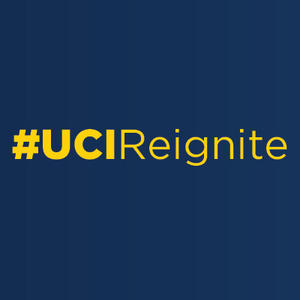
The COVID-19 pandemic has changed life as we know it with tremendous impact to our work, our homes, families and everything in between. With so many changes, staying motivated and connected to research interests is hard! Through the Physical Sciences #UCIReignite campaign we hope to spur our research community to reconnect with their passion for science.
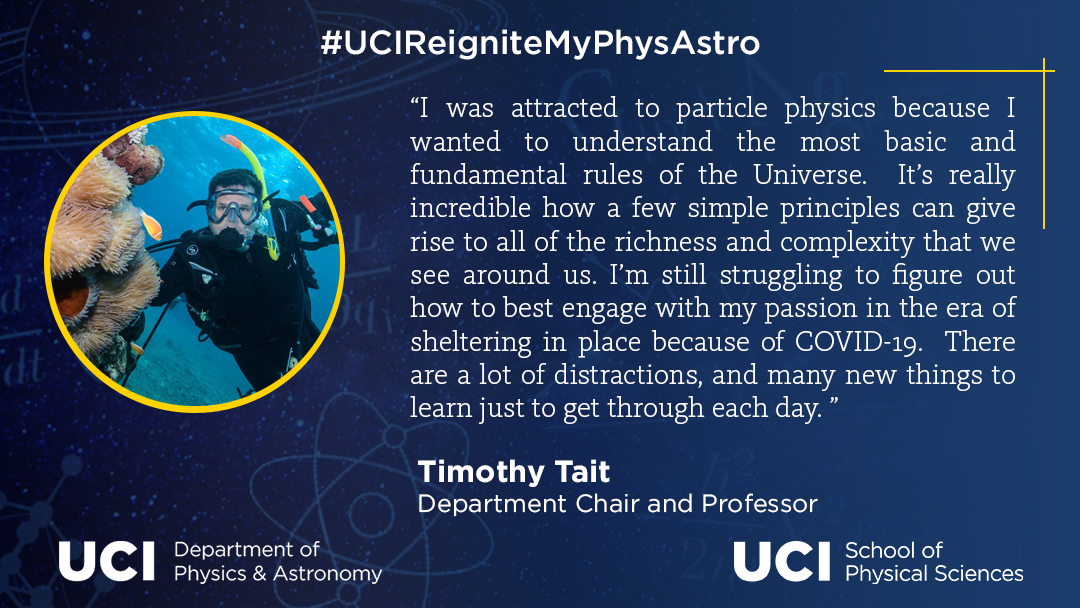 Tell us about yourself.
Tell us about yourself.
I'm Tim Tait, a particle physicist and also the current chair of the Department of Physics & Astronomy.
What do you love about your research?
What I really love about my research is never knowing exactly where it will take me. There are so many different ways that we human beings can learn about the Universe, and often when you start to think about a question, you find it takes you in totally unexpected directions and trying to learn Physics that is new to you. Sometimes it is overwhelming, but mostly it is exhilarating.
What first attracted you to the work you do?
I was attracted to particle physics because I wanted to understand the most basic and fundamental rules of the Universe. It’s really incredible how a few simple principles can give rise to all of the richness and complexity that we see around us.
How are you reigniting your passion during this time, and do you have any tips for how others can do the same?
I’m still struggling to figure out how to best engage with my passion in the era of sheltering in place because of COVID-19. There are a lot of distractions, and many new things to learn just to get through each day.
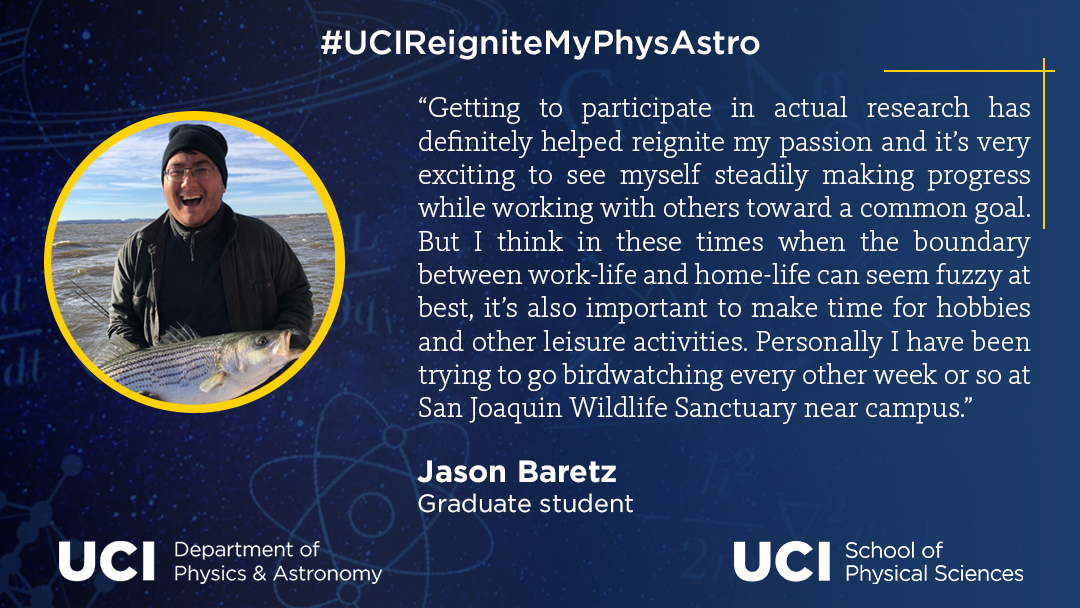 Tell us about yourself:
Tell us about yourself:
I’m Jason Baretz, a physics graduate student interested in particle physics.
What do you love about your research?
As a first-year grad student I’ve spent most of my time so far just taking classes, but I am really excited to start getting more involved with research and discovering what I like.
What first attracted you to the work you do?
Like many in the physical sciences I’ve always had a deep curiosity about how the world works, which has drawn me toward studying physics at the most fundamental levels.
How are you reigniting your passion during this time, and do you have any tips for how others can do the same?
Getting to participate in actual research has definitely helped reignite my passion and it’s very exciting to see myself steadily making progress while working with others toward a common goal. But I think in these times when the boundary between work-life and home-life can seem fuzzy at best, it’s also important to make time for hobbies and other leisure activities. Personally I have been trying to go birdwatching every other week or so at San Joaquin Wildlife Sanctuary near campus.
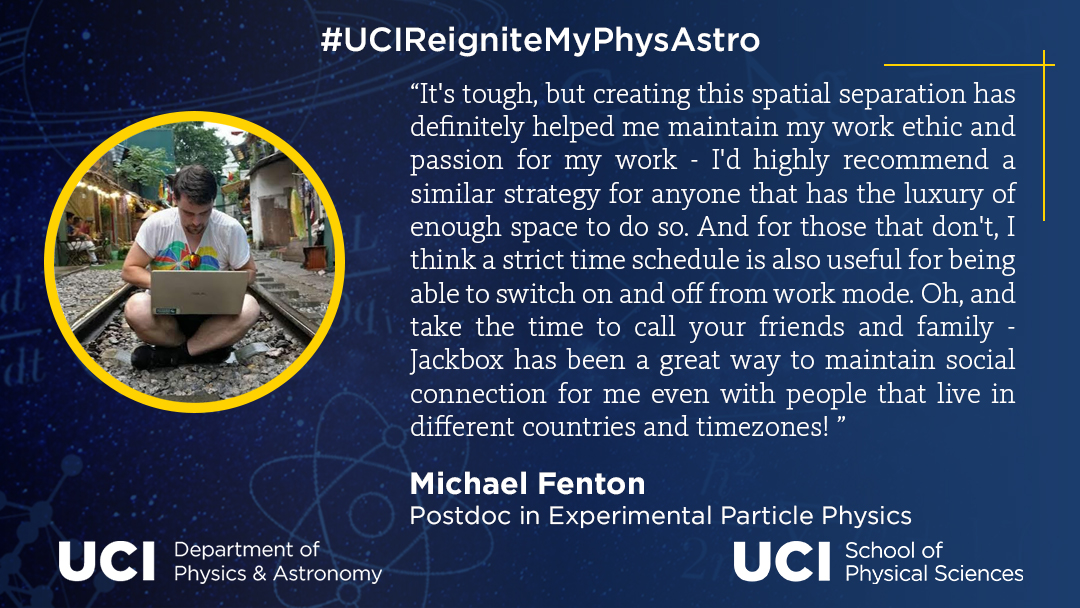 Tell us about yourself:
Tell us about yourself:
I'm Michael Fenton, postdoc in Experimental Particle Physics.
What do you love about your research? I've always loved the international nature of the research I do. I work on the ATLAS experiment, which is based at CERN just outside Geneva. In fact, the LHC ring itself crosses borders, running through both France and Swiss land. And while there are many people based there, there are many more like myself based in labs and universities around the world all working together to analyse the data and build future upgrades of the detector. So, though many are currently adjusting to remote work and virtual meetings, we've been doing exactly that for years to connect with our colleagues across the world on a day to day basis. Of course, I miss seeing my Irvine colleagues, but I'm grateful that I have had that experience already to help deal with the transition to the new normal.
What first attracted you to the work you do?
For me, experimental particle physics is like a puzzle. At the LHC, we smash together two protons at high energy in the centre of our detector, and then get all these hits spraying out from there. By the time they reach the detector hardware (which extends from micrometers away from the collision, to several meters out radially), there have been all manner of intermediate states of matter and it is our job to work backwards from those and piece together what exactly happened right there in the centre.
How are you reigniting your passion during this time, and do you have any tips for how others can do the same?
The main transition for me has been establishing a new routine. I've set up my work station in a quiet corner of the apartment, away from where I would normally spend my down time. It's tough, but creating this spatial separation has definitely helped me maintain my work ethic and passion for my work - I'd highly recommend a similar strategy for anyone that has the luxury of enough space to do so. And for those that don't, I think a strict time schedule is also useful for being able to switch on and off from work mode. Oh, and take the time to call your friends and family - Jackbox has been a great way to maintain social connection for me even with people that live in different countries and timezones!
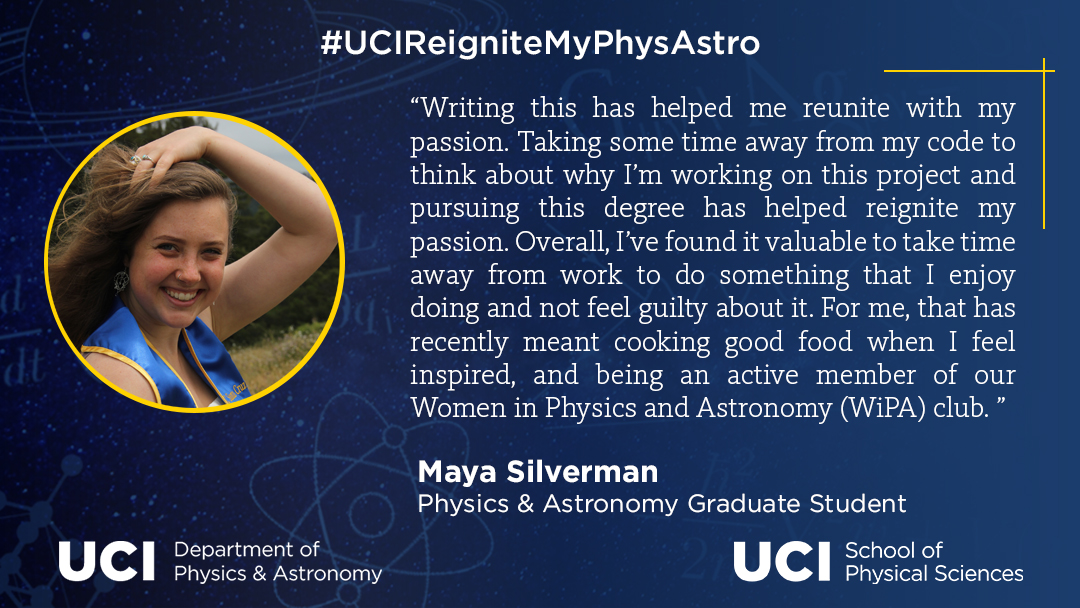 Tell us about yourself:
Tell us about yourself:
I'm Maya Silverman, Physics & Astronomy graduate student.
What do you love about your research?
I love that I get to work with data that no one has used before. If I make a plot, I am the first person who gets to interpret it. I love that I can tell a computer to do exactly what I want and it does it. I am still learning, but being able to harness that power can produce amazing results.
What first attracted you to the work you do?
I was first intrigued by the mysteries of our universe, specifically dark matter. I got hooked when I experienced firsthand how we can learn about dark matter through computational and mathematical tools. It’s fascinating! We can make predictions about the real world that are so precise, yet we are still faced with so many unknowns.
How are you reigniting your passion during this time, and do you have any tips for how others can do the same?
Writing this has helped me reunite with my passion. Taking some time away from my code to think about why I’m working on this project and pursuing this degree has helped reignite my passion. Overall, I’ve found it valuable to take time away from work to do something that I enjoy doing and not feel guilty about it. For me, that has recently meant cooking good food when I feel inspired, and being an active member of our Women in Physics and Astronomy (WiPA) club.
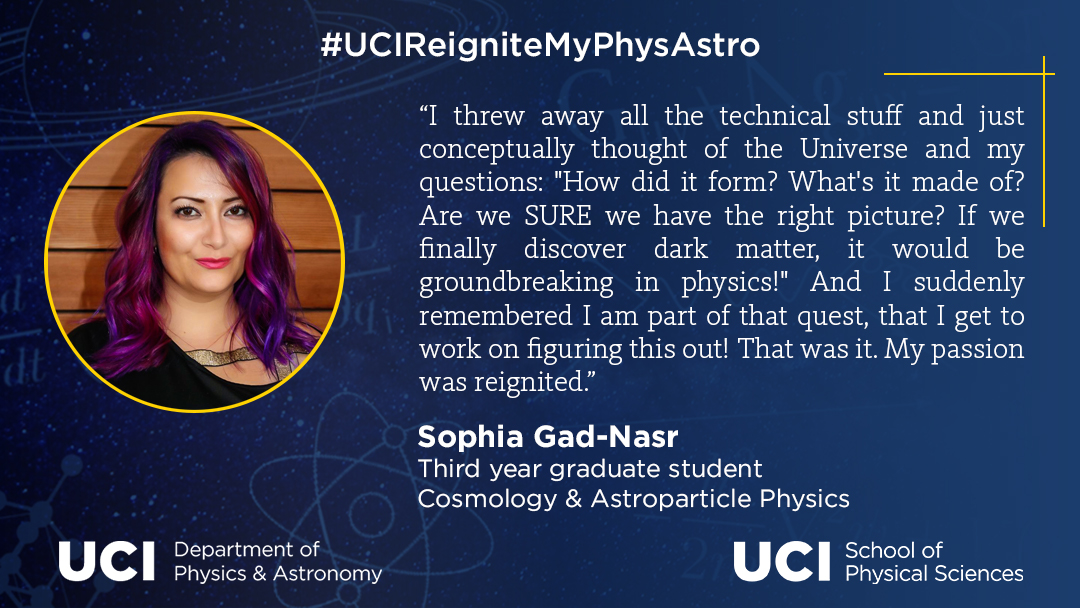 Tell us about yourself:
Tell us about yourself:
I'm Sophia Gad-Nasr, a 3rd year cosmology and astroparticle theory grad student. I'm also the SciComm Fellow for the Department of Physics & Astronomy!
What do you love about your research?
The thing I love about my research is that, in using simulated universes to study dark matter, I essentially get to play with toy universes! That means I can look at galaxies at any point in their history, from their formation until today, and use theory to figure out answers to questions I have about our Universe.
What first attracted you to the work you do?
I feel fortunate that during my 3rd year of undergrad, a new professor joined the faculty who worked on dark matter from a theoretical standpoint. He eventually became my research advisor. The moment I began working with him, I knew this was what I wanted to do in grad school: cosmology!
How are you reigniting your passion during this time, and do you have any tips for how others can do the same?
It's been difficult to get to back to work while practicing social distancing. It's as though I forgot why I love what I do. What worked for me (and what I'd give as advice to anyone facing a similar issue) is throwing away all the technical stuff and just conceptually thinking of the Universe and my questions: "How did it form? What's it made of? Are we SURE we have the right picture? If we finally discover dark matter, it would be groundbreaking in physics!" And I suddenly remembered I am part of that quest, that I get to work on figuring this out! That was it. My passion was reignited."
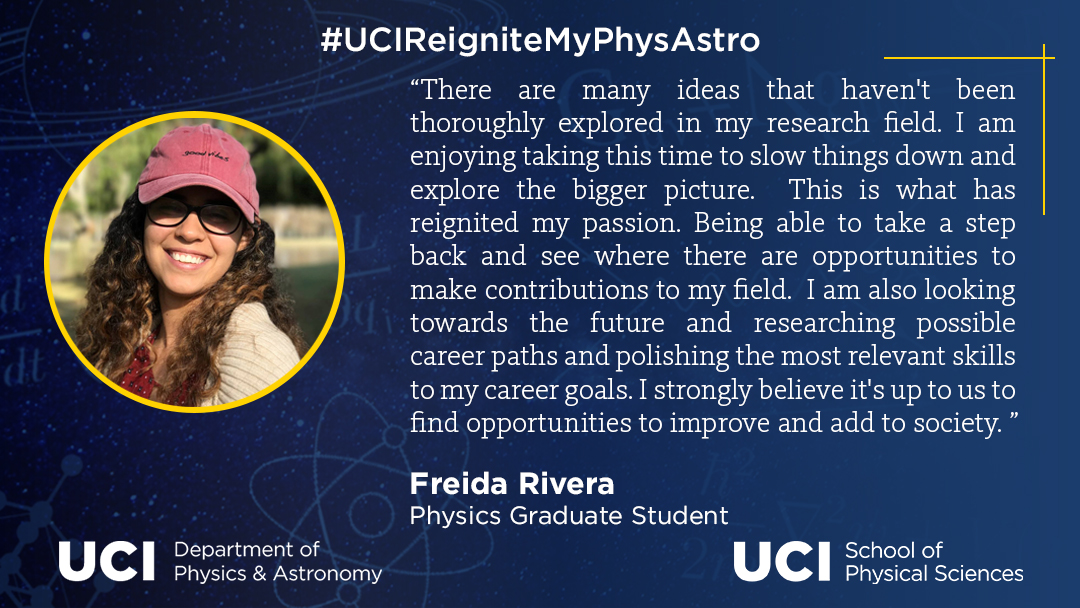 Tell us about yourself:
Tell us about yourself:
My name is Freida Rivera and I am a graduate student studying particle physics.
How are you reigniting your passion during this time, and do you have any tips for how others can do the same?
Just because something hasn't been done before doesn't mean it's not worth exploring. There are many ideas
that haven't been thoroughly explored in my research field. I find that I often get fixated on the day to day work of my research. I am enjoying taking this time to slow things down and explore the bigger picture. This is what has reignited my passion being able to take a step back and see where there are opportunities to make contributions to my field. I am also looking
towards the future and researching possible career paths and polishing the most relevant skills to my career goals. I strongly
believe it's up to us to find opportunities to improve and add to society.
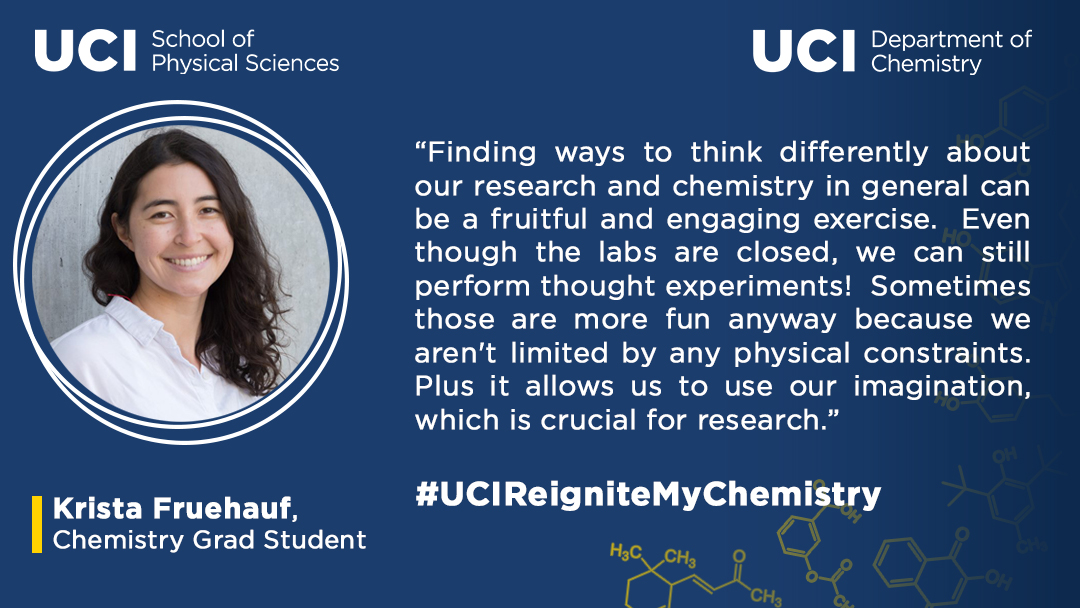 Tell us about yourself.
Tell us about yourself.
I'm Krista Fruehauf, a graduate student in chemistry studying polymers. I'm also the SciComm Fellow for the Department of Chemistry!
What do you love about your research?
I truly enjoy making molecules and putting them into polymers. It's been so fun messing around with chemistry to make a material that I can then use in applications that can help people and the environment.
What first attracted you to the work you do?
I've always been fascinated by making molecules, so to be able to do that and put them into a functioning material that I made myself has been so cool. I have always wanted to help the world in some way, shape, or form and I think being an organic polymers chemist has allowed me to be a part of that process.
How are you reigniting your passion during this time, and do you have any tips for how others can do the same?
Now that I can't be in the lab, I've been doing a lot more thought experiments. Whether it's my own research or other topics, I've been engaging my mind. I think it's important to remind ourselves that even though we can't apply our knowledge to lab work right now, we can keep learning about what we enjoy. Finding ways to think differently about our research and chemistry in general can be a fruitful and engaging exercise. Even though the labs are closed, we can still perform thought experiments! Sometimes those are more fun anyway because we aren't limited by any physical constraints. Plus it allows us to use our imagination, which is crucial for research.
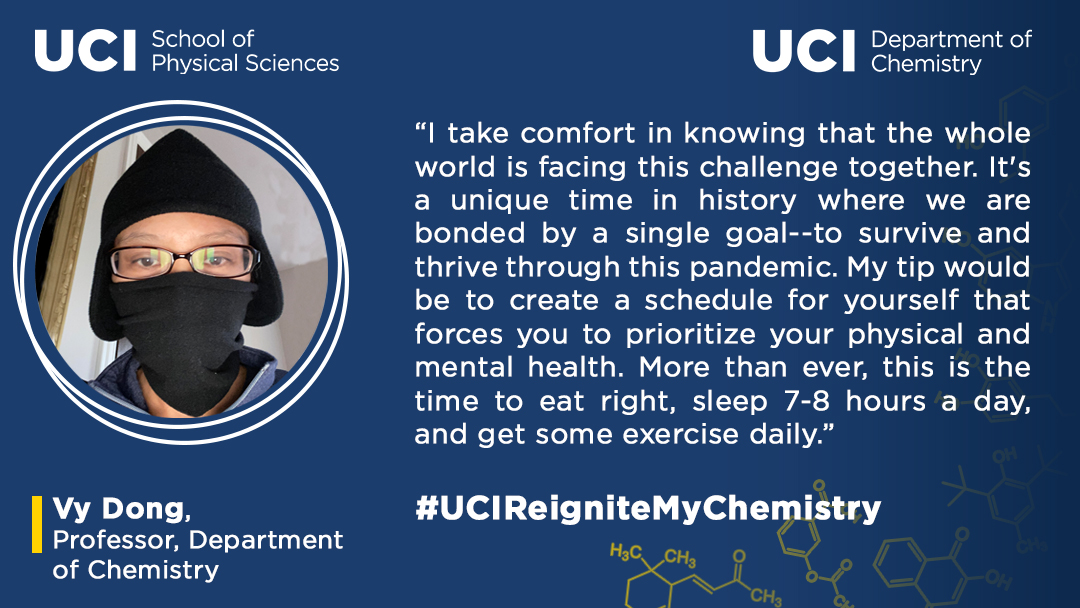 Tell us about yourself.
Tell us about yourself.
I'm Vy Dong, a Chemistry Professor. An interesting fact about me is that I have two younger sisters and a younger brother and all of our names rhyme with our parents. It's Vy, Thy, Chi, and Phi. My dad's name is Ly and my mom Lee. Growing up, things sometimes got confusing.
What do you love about your research?
We are molecular architects--in this case, however, we not only design the blueprints (strategies) on how to construct a molecule of interest, we also invent chemical tools (catalysts and reagents). Prior to the lab-ramp down, we were using transition metal catalysis to connect common functional groups (e.g., an aldehyde and an olefin, a thiol and a diene, an ester and an alkyne). These novel transformations generate chiral motifs with stereocontrol and atom-economy. Due to the COVID-10 outbreak, my team is focused on collaborative projects within the department that tackle the coronavirus. It's been a very meaningful learning experience and we've been fortunate to work with great colleagues and students from other labs.
How are you reigniting your passion during this time, and do you have any tips for how others can do the same?
I take comfort in knowing that the whole world is facing this challenge together. It's a unique time in history where we are bonded by a single goal--to survive and thrive through this pandemic. My tip would be to create a schedule for yourself that forces you to prioritize your physical and mental health. More than ever, this is the time to eat right, sleep 7-8 hours a day, and get some exercise daily. And as I shared on twitter recently, UC Berkeley's Greater Good Magazine has a list of six daily quarantine questions that are spot on (see attached).
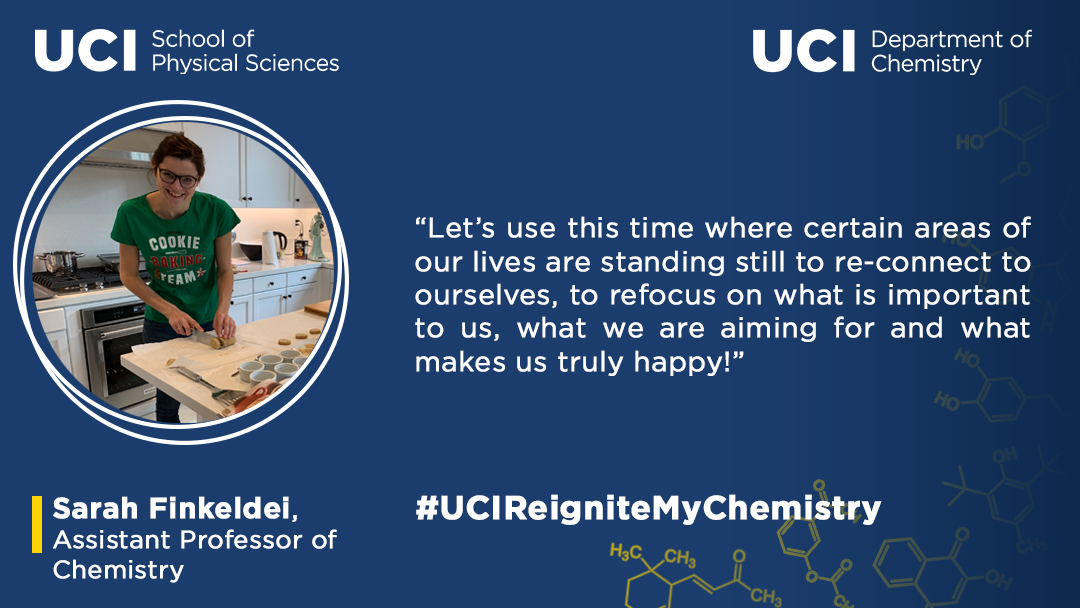 Tell us about yourself.
Tell us about yourself.
I'm Sarah Finkeldei, assistant professor for the Department of Chemistry! I truly miss going to work and meeting my students, colleagues and group members face to face. Until then my kitchen is my playground for experiments – all of them are edible though ;)
What do you love about your research?
In my group, we study complex oxides in the nuclear fuel cycle. Our research aims to contribute to solve the scientific and societal challenge to safely dispose nuclear waste. We are also interested in studying high-performance UO2 fuel candidates with enhanced efficiency and safety, derived from sol-gel precursors. All our research takes place at the interface of chemistry and materials science, and I have always enjoyed and valued working with interdisciplinary teams.
How are you reigniting your passion during this time, and do you have any tips for how others can do the same?
Let’s use this time where certain areas of our lives are standing still to re-connect to ourselves, to refocus on what is important to us, what we are aiming for and what makes us truly happy!
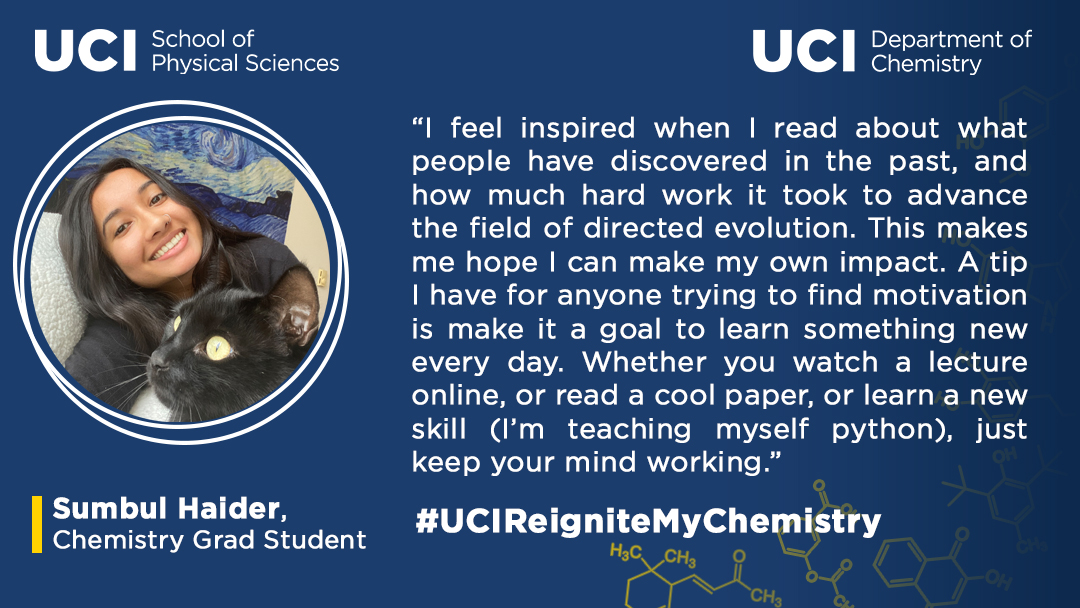 Tell us about yourself.
Tell us about yourself.
I'm Sumbul Haider, Chemistry graduate student.
What do you love about your research?
My lab does research on directed evolution and I love it because it’s so subversive. Well, I think chemistry itself is subversive. Scientists in the past realized the therapeutic potential of chemicals found in nature but didn’t have the knowledge to re-engineer the biological processes that produced them. But instead of giving up, they developed their own synthetic methods, giving rise to the field of organic chemistry.
What first attracted you to the work you do?
I started off as a synthetic organic chemist, and I intended to do my PhD in a synthetic lab before my interests shifted toward chemical biology. I’m attracted to this field because it's new and exciting. I see it as a continuation of our efforts to not only understand but harness the power of biology. We can use directed evolution to explore a vast sequence space and evolve enzymes capable of solving human problems.
How are you reigniting your passion during this time, and do you have any tips for how others can do the same?
I think my passion for research is still alive during this time because anxiety is my friend. And that comes from my deep discomfort with not knowing something. But I’m trying to use those feelings to be productive with my time by learning more about my field. I feel inspired when I read about what people have discovered in the past, and how much hard work it took to advance the field of directed evolution. This makes me hope I can make my own impact. A tip I have for anyone trying to find motivation is make it a goal to learn something new every day. Whether you watch a lecture online, or read a cool paper, or learn a new skill (I’m teaching myself python), just keep your mind working.
 Tell us about yourself.
Tell us about yourself.
I'm Rachel Martin, Professor of Chemistry and Molecular Biology & Biochemistry. My husband and I went to visit our favorite carnivorous plant in the wild in South Africa after sequencing its genome. I am pointing to it in the photo, but it’s pretty small.
What do you love about your research?
My favorite thing about biophysical chemistry is that there are amazing discoveries waiting absolutely anywhere you look. Every organism, no matter how humble, contains a whole universe of molecules we can study and put to work.
What first attracted you to the work you do?
I am interested in everything, but I keep coming back to NMR because it is such a versatile technique. It is useful for studying structure, dynamics, and intermolecular interactions over a wide range of timescales.
How are you reigniting your passion during this time, and do you have any tips for how others can do the same?
I am working on new strategies for inhibiting the virus that causes COVID-19 with my group members and colleagues. Even though the problem is very difficult and speed is critical, staying connected with other scientists and working together is encouraging and invigorating.
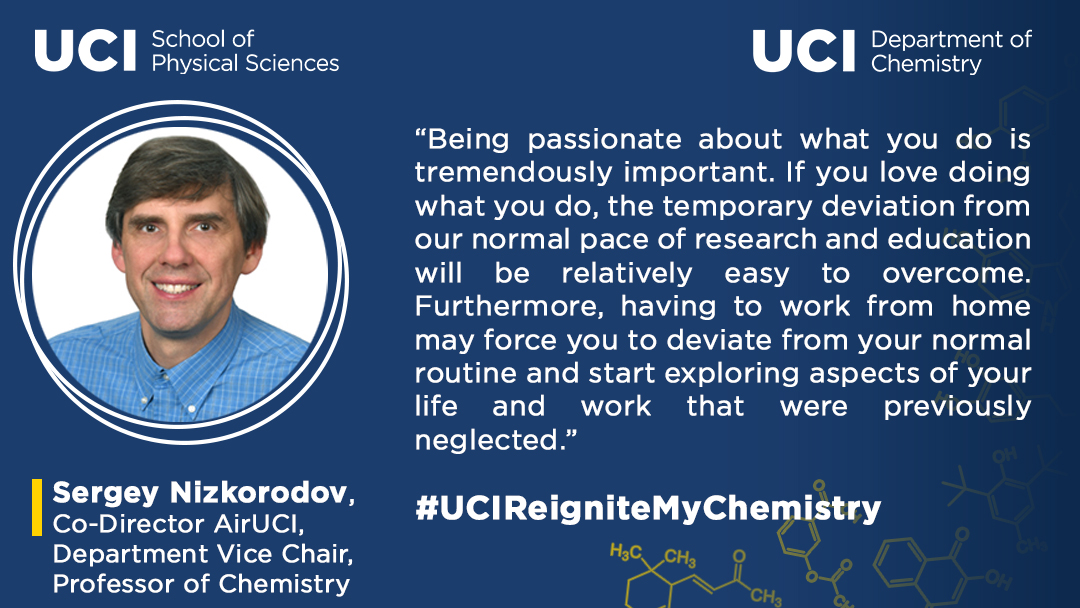 Tell us about yourself.
Tell us about yourself.
I'm Sergey Nizkorodov, Co-Director of AirUCI, Department Vice Chair and professor of chemistry. An interesting fact about me that may be relevant in today's situation is that I was a college student in Novosibirsk when Soviet Union disintegrated. It was a low point for the whole country: food disappeared from shelves, salaries were not paid, money became worthless, utility services became intermittent, etc. This hit my family quite hard because we already had two wonderful children at that time (photo attached). We had to make ends meet by doing menial jobs, growing our own food, and trading valuable possessions for necessities. It was essential to stay together, be positive and forward looking, and not give up under these circumstances. I was extremely lucky that a professor in Switzerland, John Maier, decided to take a gamble with me and arranged to have me accepted in graduate school at Basel University. Attending the graduate school in Basel has profoundly changed the life of my family, and propelled me towards my current career path.
What do you love about your research?
I study atmospheric chemistry, which represents a great fusion of fundamental and applied sciences. I love how broad this field is: we read and publish all kinds of science and engineering papers (physical chemistry, analytical chemistry, meteorology, geosciences, food chemistry, toxicology, epidemiology, biology, aerospace engineering, to name a few). I also love how collaborative this field is, with many studies done by teams of laboratory researchers, field researchers, theorists and modellers. Finally, the field is small enough that everyone in this research area knows each other, and we are all exceptionally collegial. I am really fortunate to be at UCI, which is a internationally-recognized hub of atmospheric chemistry research. As a result, I have fantastic graduate students, unbelievably wonderful colleagues, and can enjoy a constant stream of visitors, who want to work with us.
What first attracted you to the work you do?
My college was in an academic town called Akademgorodok (https://en.wikipedia.org/wiki/Akademgorodok), where the majority of the population worked in research institutes. Some of these people frequently taught seminars at our university. I was amazed how passionate they were about their work, and how intelligent they all were. My admiration with my college instructors drove me into doing research, which initially was in chemical physics. A major factor that catalyzed my transition into atmospheric chemistry was attending a Gordon Conference in Atmospheric Chemistry conference and discovering how much more diverse it was compared to any of the conferences I attended before. This diversity made the conference so much more energetic and vibrant, and helped me fall in love with this research field.
How are you reigniting your passion during this time, and do you have any tips for how others can do the same?
Being passionate about what you do is tremendously important. If you love doing what you do, the temporary deviation from our normal pace of research and education will be relatively easy to overcome. Furthermore, having to work from home may force you to deviate from your normal routine and start exploring aspects of your life and work that were previously neglected. For example, I find that I have more time to read research literature, learn new educational tools, learn new cooking recipes, read more books, and go on more walks between stretches of work. Another way to get motivated is to get inspiration from some of our predecessors who had to do science under much harder circumstances than we experience now. A classic example in my field of research is Nikolai Fuchs (http://www.iara.org/newsfolder/pioneers/2AerosolPioneerEditedAugNAFuchs.pdf), one of the pioneers of aerosol science, who was arrested for political reasons during the most productive time in his science career, and had to do research in a special prison for 8 years. This has not stopped him from writing the most influential monograph in aerosol research later in life. The point of this, we should not let minor inconvenience prompted by working from the comfort of our home slow us down!
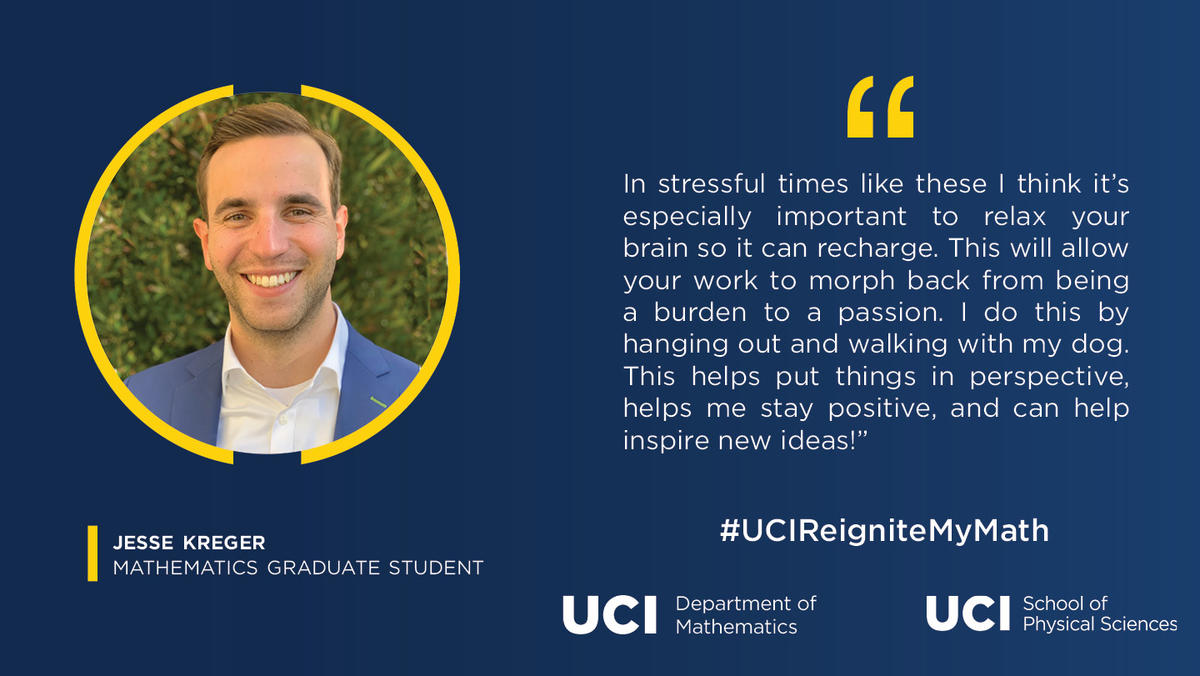 Tell us about yourself.
Tell us about yourself.
I'm Jesse Kreger, a 4th year in math studying mathematical biology. I'm also the SciComm Fellow for the Department of Mathematics!
What do you love about your research?
I work on the mathematical modeling of virus dynamics. I love that I am able to use logic and equations to try and better understand the physical world around me.
What first attracted you to the work you do?
As a mathematical biologist, I am able to combine my passion for math and biology. Combining math and biology is a dynamic intersection that has been increasingly valued and is useful in tackling important questions in biology and inspiring new questions and techniques in mathematics.
How are you reigniting your passion during this time, and do you have any tips for how others can do the same?
In stressful times like these I think it's especially important to relax your brain so it can recharge. This will allow your work to morph back from being a burden to a passion. I do this by hanging out and walking with my dog. This helps put things in perspective, helps me stay positive, and can help inspire new ideas!
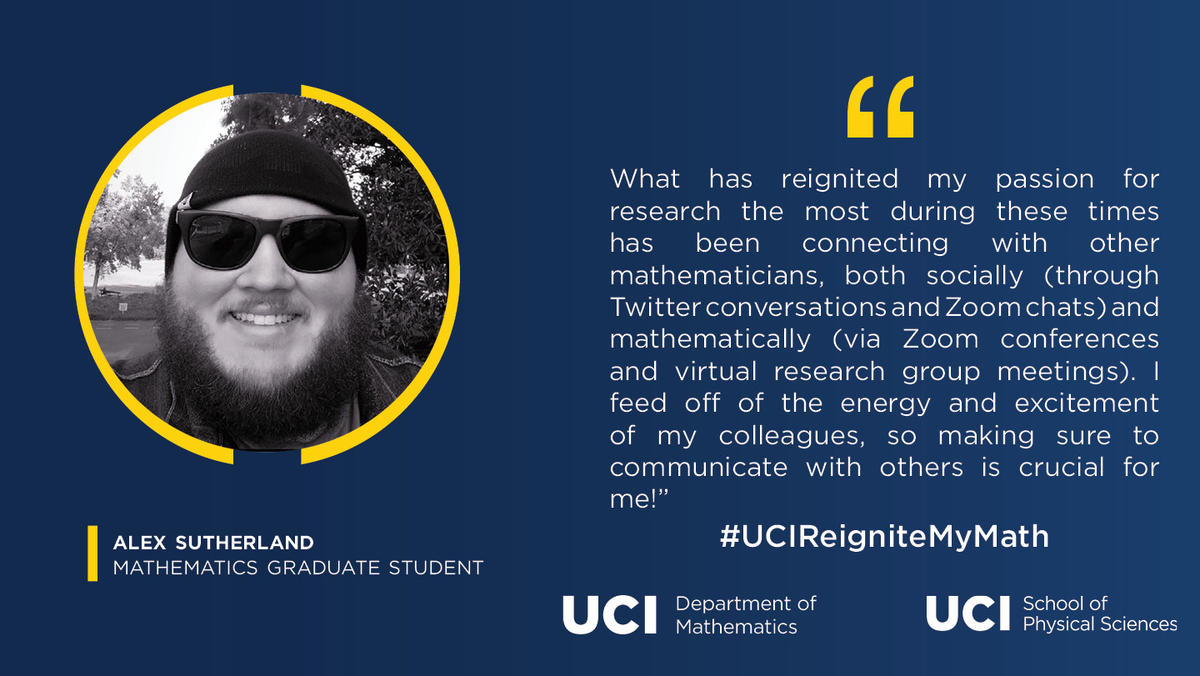 Tell us about yourself.
Tell us about yourself.
I'm Alex Sutherland, a 4th year Ph.D candidate in mathematics. I was one of UCI's Pedagogical Fellows for 2019!
What do you love about your research?
I work on questions about solving polynomials - a topic that has been studied for thousands of years. I love that my research actively brings together several disciplines that are often thought of as disjoint (topology, geometry, algebra) and that any problem I work on requires me to always be thinking within these multiple frameworks at the same time.
What first attracted you to the work you do?
My research area has a history that is not only mathematically interesting, but inherently tied to human history as well. Many of the articles most relevant to my research are from the late 1800s and early 1900s, which is very uncommon for most grad students in mathematics. I have loved going back to these original texts and digging up shockingly modern perspectives on classical questions.
How are you reigniting your passion during this time, and do you have any tips for how others can do the same?
What has reignited my passion for research the most during these times has been connecting with other mathematicians, both socially (through Twitter conversations and Zoom chats) and mathematically (via Zoom conferences and virtual research group meetings). I feed off of the energy and excitement of my colleagues, so making sure to communicate with others is crucial for me!
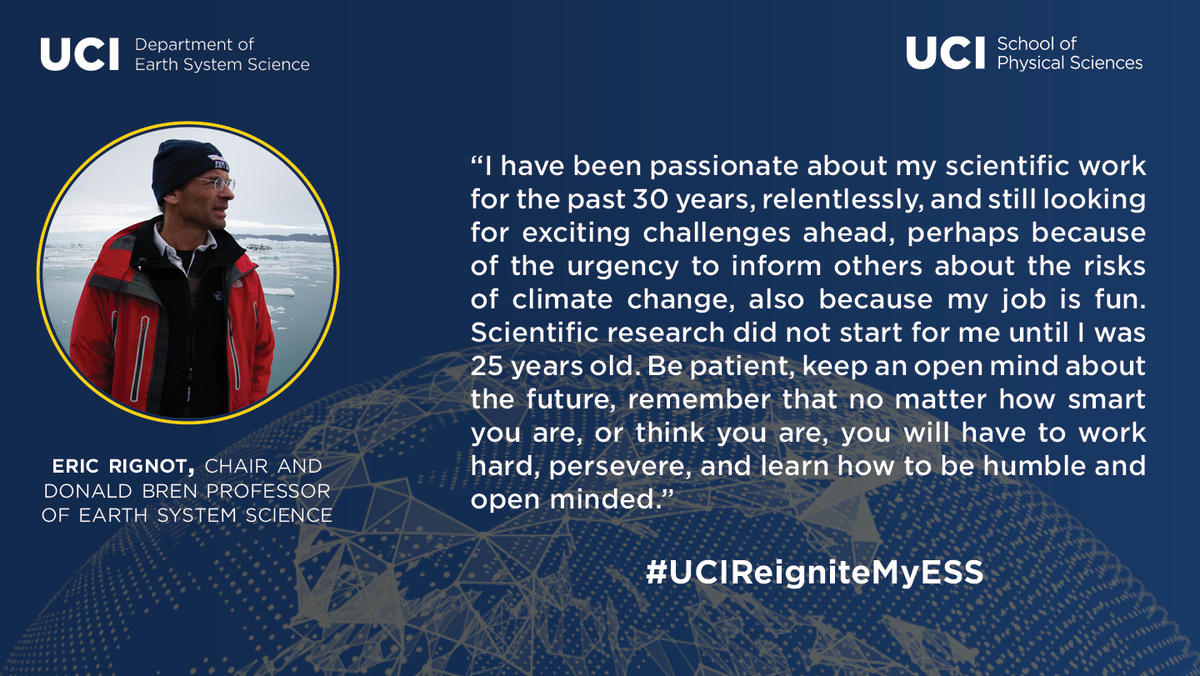 Tell us about yourself.
Tell us about yourself.
My name is Eric Rignot and I am a glaciologist and current chair and professor of UCI's Department of Earth System Science.
What do you love about your research?
I love the exploratory nature of my work, its interdisciplinary character, the extraordinary observations that we have been able to gather from satellites for the first time, the sheer beauty of the polar regions, and my interactions with other people.
What first attracted you to the work you do?
I always loved physics and math, which got me into engineering and into a method of solving problems, but then I drifted to science which offered beautiful physical challenges in terms of exploration and discovery.
How are you reigniting your passion during this time, and do you have any tips for how others can do the same?
I have been passionate about my scientific work for the past 30 years, relentlessly, and still looking for exciting challenges ahead, perhaps because of the urgency to inform others about the risks of climate change, also because my job is fun. Scientific research did not start for me until I was 25 years old. Be patient, keep an open mind about the future, remember that no matter how smart you are, or think you are, you will have to work hard, persevere, and learn how to be humble and open minded.
Project Collaborators: Tatiana Arizaga, Krista Fruehauf, Jesse Kreger, Tiffany Kuo, Sophia Nasr, Fe Valencia
